2023 CHOICE Awards
7/5/2023 The idea for the CHOICE awards originated eight years ago and was inspired by Japan’s Living National Treasures. That program honors “preservers of important intangible cultural properties.” In the years after World War II, anxiety arose in Japan that their unique cultural traditions — noh, kabuki, origami, kumi, sumo, teapot ceramics, noodle making — might be swamped by the conquering Western culture. By honoring revered masters of those arts, they saved them and made them important to a new generation.
The idea for the CHOICE awards originated eight years ago and was inspired by Japan’s Living National Treasures. That program honors “preservers of important intangible cultural properties.” In the years after World War II, anxiety arose in Japan that their unique cultural traditions — noh, kabuki, origami, kumi, sumo, teapot ceramics, noodle making — might be swamped by the conquering Western culture. By honoring revered masters of those arts, they saved them and made them important to a new generation.
Our original intention at CITYVIEW was to do something similar for Iowa’s venerable, living food pioneers. That evolved into a veritable hall of fame for people and food institutions that gave our city and state a singular quality and identity. CITYVIEW’s Hall of Iowa Culinary Excellence (CHOICE) awards began at a time when locals rued the passing of two of the most memorable food icons in Iowa history. The Younkers Tea Room was lost in a fire, and Dahl’s stores were sold or closed.
For the charter edition of the awards, we focused on venerability — enduring traditions and pioneers who were still alive. The Japanese word “sabi” refers to a kind of beauty that is attained by aging, when an object’s elegance is evidenced by a changing patina. The word is most often applied to tea pots whose glaze has been changed by decades and even centuries of having tea intentionally poured over the top to drip down over the pot. In that spirit, our charter members in 2015 all had histories dating back to at least the mid-20th century. Several topped more than a century of service to central Iowa. The following year’s class of honorable food pioneers was younger, but all blazed new trails that influenced the culinary scene of Des Moines in unique ways. Since then, we have expanded upon both categories of excellence.
The Class of 2023
This year’s class goes back to the bread and butter of hospitality. We honor Iowa’s grandest waitress and eight legendary restaurants.
Marie Hainline, Bonaparte
In May, the grand dame of Bonaparte, Marie Hainline, celebrated her 100th birthday at Bonaparte Retreat, where she waited tables regularly for 30 years, until 2021. The restaurant itself occupies a 150-year-old building that was originally a mill. At her centennial, she told KTVO TV that she had lived many lives, making her way to California in WWII to be near her husband, running a farm, buying a nursing home and working dinner theaters, many of them.
She has survived breast cancer, a recent heart attack, which she thought was COVID, and now owns the key to the city of Bonaparte, where she is revered. On waiting tables at age 98, she said it was no big deal because she only covered two tables at a time.
Hamburg Inn No. 2, Iowa City
The historic Hamburg No. 2 Inn claims to offer “a tradition of comfort food in a fifties time capsule.” For that or whatever reason, the diner has fed hangover-curing breakfasts and sandwiches to at least four generations of University of Iowa students and visitors from all over the world.
One of those former students is current owner Michael Lee, who lives in Taiwan. He has professed ideas as divergent as turning the place into an international chain and closing it completely. There were gasps of relief this year when the latter idea was reconsidered and the place reopened after two months.
Politicians and candidates regularly visit the HI2 when they swing through Iowa City. Former presidents Ronald Reagan, Bill Clinton and Barack Obama made it part of their campaign strategies and all were re-elected by huge margins. The restaurant hosts the Coffee Bean Caucus every primary season, attracting national and international attention to Iowa politics.
Joe Panther started the Hamburg Inn on Iowa Avenue in the mid 1930s. Joe’s brother, Adrian, joined the business and eventually bought the restaurant. In 1948, he moved it to the former Mrs. Van’s Restaurant at 214 North Linn St. Over the years, the family developed Hamburg Inns in two additional Iowa City locations and one Cedar Rapids venue. Since 2011, only the North Linn store operates. The Lee family has trademarked Hamburg Inn No. 2 as “your Mama’s cooking will always be No.1, but when No.1 isn’t available, Hamburg Inn No. 2 is the next best choice.”
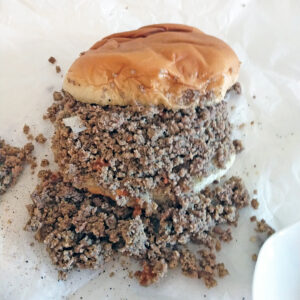
A “canteen” by any other name would not taste as sweet.
Canteen Lunch in the Alley, Ottumwa
Canteen Lunch in the Alley opened its original five-stool Canteen Lunch in 1927 and moved to its current address in 1936 with 16 stools under the second street parking ramp in Ottumwa. It remains an outstanding example of early to mid-20th century lunchrooms that developed as social gathering spots during the Great Depression and WWII. “The Canteen” offered simple, affordable short-order food in a setting designed (horseshoe shaped) to encourage conversation with everyone else.
“Canteen” is also the name of the loose-meat sandwich that thrives more in Iowa than any other state. The grind of the beef is finer than standard store ground beef. Attempts to use a coarser grind were immediately rejected by customers. The sandwich is served on an oversized custom-made bun that is cut and hinged. The sandwich is placed in a custom wax paper wrapper that has a thicker than average wax coating for extra protection. Sandwiches can be ordered “wet,” meaning they are dipped in drippings. A teaspoon is included with the sandwich to scoop out any remaining beef from the paper. The beef is stirred as it cooks in full sight of the patrons.
In 2000, the City of Ottumwa decided to build a downtown parking ramp in the current location of the Canteen. Upon offering to purchase the building, or paying for the building to be moved to another location, the owners and patrons insisted that it remain in place. Subsequently, in 2004, air rights were purchased above the Canteen, and the parking ramp was constructed around and above the café. On Nov. 20, 2015, Scott and Janice Pierce became the new owners of Canteen Lunch in the Alley.
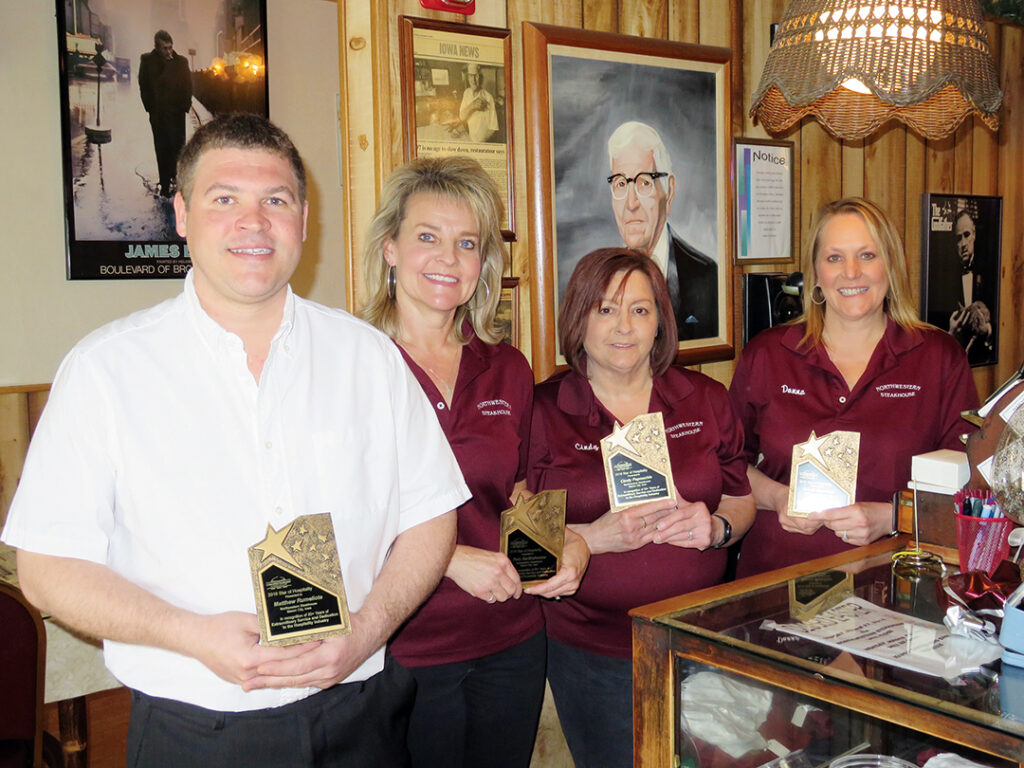
Northwestern Steakhouse employees being honored for 20 years of service with founder Tony Papouchis’ portrait looking on.
Photo courtesy of Iowa Restaurant Association.
Northwestern Steak House, Mason City
Mason City is the most Greek town in Iowa. Immigrants Pete Maduras and Tony Papouchis opened Pete’s Place in 1920 to serve the Greek community of Cerro Gordo County. The original location was sandwiched between two large cement plants in a neighborhood called Northwestern Row.
Tony and Pete strived to feed the hard workers of what used to be known as River City. At the time, T-bone steaks were 25 cents and liquor was bootlegged out of the basement. Pete operated the front of house while Tony was master of the kitchen. The partnership continued as the location moved to its current location in 1954. It became the Northwestern Steakhouse when the restaurant was sold to Tony in 1965.
Tony worked every day until he died in 1991. He had a large private garden next to the restaurant where he planted and collected an array to use fresh in his meals daily. People would look forward to Tony’s fresh salads, and especially his special Greek-inspired menu on Sundays.
Today, Tony’s son and his wife, Bill and Ann Papouchis, own and operate the Northwestern. The menu has only changed slightly throughout the years, but most of the recipes are still Tony’s. The steakhouse honors the past with old wooden booths, early movie posters hung on the walls, and photographs of a simpler time in Mason City. Customers continue to wrap around the building, and a lounge has been added upstairs for them to enjoy a drink while they await their table.
Tony continues to keep an eye on the place as his portrait is hung on the wall behind the register. Neighbors used to say they set clocks to Tony walking to the place.
In the spirit of the old days, all dinners include bread and butter, salad and choice of potato, rice or spaghetti. Special discounts are offered on weekday nights. Steaks are served Greek style, which means herbal seasonings that are similar to what is called de Burgo in Des Moines.
Suzie Q, Mason City
The Suzie Q is a 10-stool Valentine Diner model known as the “Little Chef.” Those were mail order diners manufactured in Wichita, Kansas, for 40 years in the mid 20th century. Renus Lytle brought this one to Mason City in 1947. At the time, most restaurant dining equipment was made on the east coast, but the Valentine Manufacturing company managed to ship their eight- and 10-seat diners all over America. They were successful because they were designed to be operated by just one or two people.
The fryer and flat top stove produce breaded pork tenderloins, burgers, melted cheese, BLTs and cheezy weezzies, with a house cheese blend. Fries are hand cut, and onion rings are famous. Today, Tahmyra Lytle runs the show, and the prefabricated diner is one of fewer than 20 surviving Valentines nationally. At press time, the Suzie Q was temporarily closed while the apartments next door recovered from a fire.
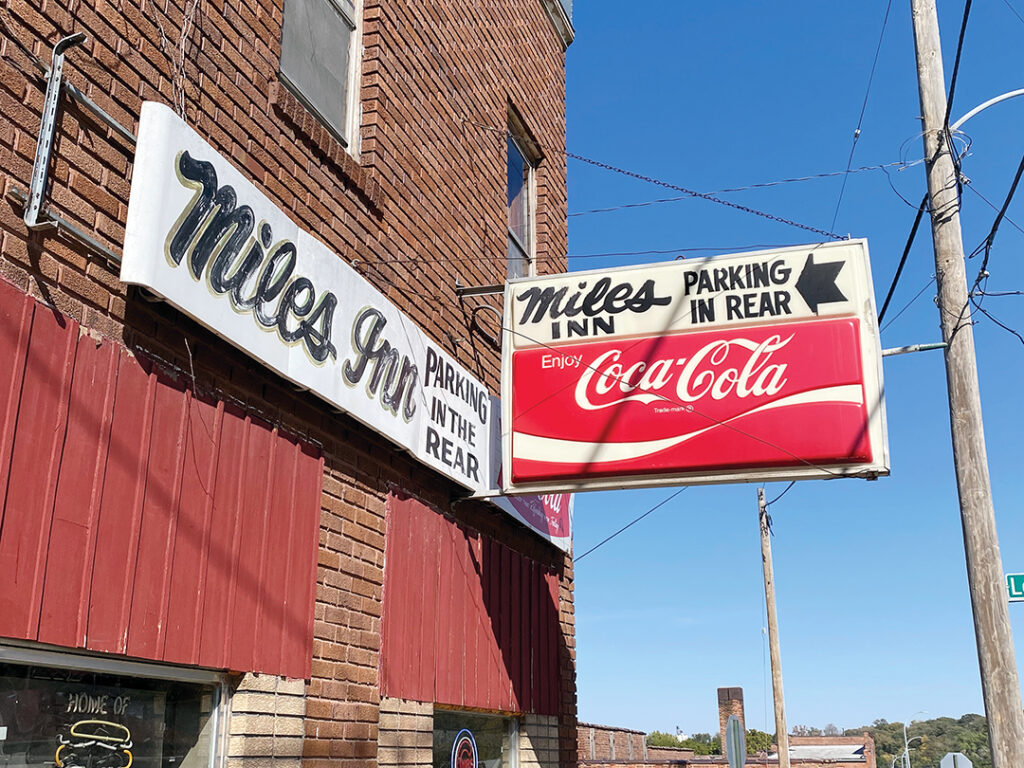
Miles Inn, Photo by George Formaro
Miles Inn, Sioux City
John Miles opened the Miles Inn as a convenience store in 1925 before transitioning it into a bar sometime in the 1940s. In the hard times after the Depression, Sioux City tavern owners came up with the idea of making sandwiches with loose meat, called “taverns,” that were sold very cheap, or even given free to encourage customers to drink longer.
The Miles Inn’s “Charley Boy” is probably the most famous such “tavern” sandwich in Siouxland. It was likely named for John Miles’ son Charley. The Charley Boy still brings people back to the Inn, especially on holidays. Today, they are sold with both hot dog and burger buns. Chili, dogs and nachos also encourage the drinking of more schooners.
Old-style nostalgia is magnetic. Clientele spans generations. The Inn supports Hawkeye sports, Morningside, Sioux City East and the hockey team. Signage includes the claim “Coldest beer in Siouxland” and a portrait of John Miles and his wife in front of a sign reading “Remember Pearl Harbor.” Denny and Julia Lias now own the place but have no plans to change anything.
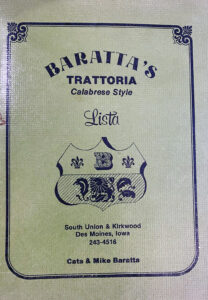
Photo by George Formaro
Baratta’s
Baratta’s is the epitome of the Italian Des Moines family restaurant. In fact, families once lived in the rooms where diners now gather for meals and special occasions. Cosomo Berard opened a small grocery store in the front of his home in a residential neighborhood on the southside in the 1940s. Specializing in Italian foods and ingredients, the store became synonymous with traditional Italian food. It transitioned into a restaurant when the Barratta family bought it after Berard’s death.
In 1993, the family sold the store and home to three local Lincoln High School alums, Joe Gatto and Curt and Lisa Kruger. Today, Joe and Lisa are continuing to maintain the charm of the original shop by serving classic Italian specialties daily, including lasagna al forno, steak de Burgo, and cannolis. Through the years, a wide variety of flavors have been added to include American cuisine. Baratta’s has been a Des Moines staple for more than 50 years and has also expanded to open Café Baratta, appropriately in the State of Iowa Historical Building.
Jaarsma Bakery, Pella
Harmon Jaarsma opened Jaarsma Bakery in 1898 with recipes he brought from Holland. Harmon had two brick ovens in the bakery that were fired with wood. After ashes were brushed out, the bread was put in to bake, followed by the buns, Dutch Letters, cookies, and, finally, rusks as the ovens slowly cooled down before re-firing. The bakery also served as a coffee shop and living quarters for the family.
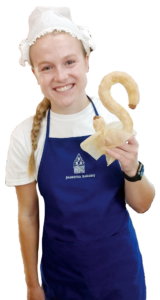
Jaarsma Bakery’s most famous products — Dutch letters and Dutch smiles.
Photo by Jim Duncan
Dutch Letters were made only as a special treat for Sinterklaas Day (the Dutch Santa Claus Day), Dec. 6. They are typically shaped into an “S” for “Sinterklaas.” Today, they are an Iowa icon, considered the state’s unique snack.
Harmon’s son, Frank, learned the business of baking from his father and in 1948 moved the bakery to its present location on Pella’s town square. With the help of Frank’s two sons, Howard and Ralph, Jaarsma Bakery provided the community with fresh bread and an assortment of pastries. In 1973, a fire burned the bakery to the ground. Under the direction of Howard and Ralph, a new bakery was built on the same site.
Family baking at Jaarsma Bakery has been carefully passed on for four generations. It is now owned and operated by Harmon’s great-granddaughter, Kristi, and her husband, Dave Balk. A full line of home-style baking features flaky pastries, tasty breads, irresistible cakes and cookies with hundreds of choices available daily. Speculaas (Dutch Spice cookies) and Boter Koek (Almond Butter cake) now rival the letters.
Breads include currant-almond and Dutch apple. Cream cakes come in blueberry or poppyseed and almond stuffing. Cracklings, cream horns, goat legs, puff pillows, strudels, butter Danish pastries, old fashioned cinnamon rolls and tarts all help build a following. ♦





















